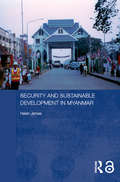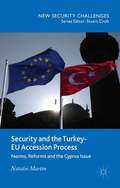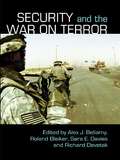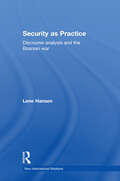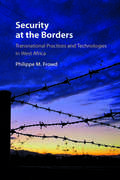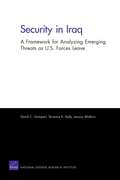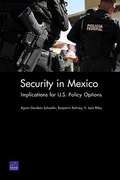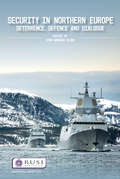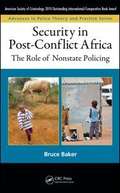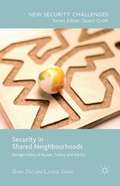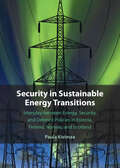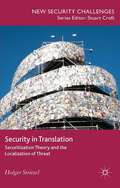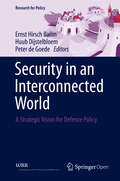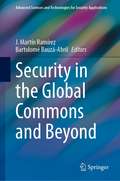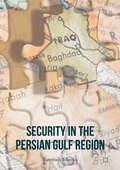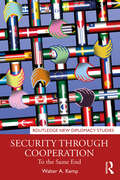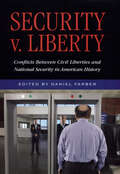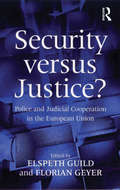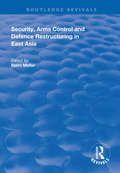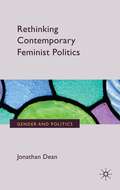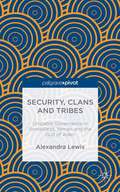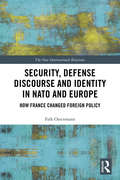- Table View
- List View
Security and Sustainable Development in Myanmar (Routledge Contemporary Southeast Asia Series #Vol. 11)
by Helen JamesHelen James considers security in Myanmar/Burma. She uses the ideas put forward in the United Nations Development Programme's 1994 report, of human, as opposed to state and security, going on to argue that freedom from want, and freedom from fear (of the regime) are in fact mutually supportive ideas, and that the security of the people and the security of the state are in fact in a symbiotic relationship with each other. Presenting new and significant information of the security concept of Myanmar/Burma, James’ original work considers economic development, health, education, environmental issues, the drugs trade, human rights, minority peoples and political, social and economic reforms, arguing that improved governance, the development of civil society and economic development would both strengthen the state and ensure the security and well-being of its citizens.
Security and the Environment
by Rita FloydIn 1993 the first Clinton administration declared environmental security a national security issue, but by the end of the Bush administrations environmental security had vanished from the government's agenda. This book uses changing US environmental security policy to propose a revised securitisation theory, one that both allows insights into the intentions of key actors and enables moral evaluations in the environmental sector of security. Security and the Environment brings together the subject of environmental security and the Copenhagen School's securitisation theory. Drawing on original interviews with former key players in United States environmental security, Rita Floyd makes a significant and original contribution to environmental security studies and security studies more generally. This book will be of interest to international relations scholars and political practitioners concerned with security, as well as students of international environmental politics and US policy-making.
Security and the Turkey�EU Accession Process
by Natalie MartinThis timely study looks at the various phases of the Turkey-European Union accession process, which began in 1959, and the implications for security. Martin explains the origins of this process, when Turkey was once considered eligible for 'European' or 'Western' status because of the Cold War context, and goes on to explore why its progress has been so impeded. Once Turkey's eligibility had been established, it was difficult for the EU to backtrack, especially in the light of the Cold Wargeostrategic imperative. Instead, opposition to the Turkish case, which was largely religious or cultural, was couched in normative terms. For as long as Turkey continued to have a poor record of human rights and democracy, the opportunities for its opponents to block the accession progress were plentiful. Between 1999 and 2004, Turkey's sustained effort to improve upon its human rights record resulted in gains in the accession process. Since 2005, however, the situation has returned to deadlock as Turkey's normative progress has ground to a halt amid resurgent opposition within the European Union and increasing authoritarianism in Turkey. This book argues that the Arab Spring and its consequences have, ironically, offered a renewed opportunity for the EU to renew accession and demand conditionality from Ankara. However, it is an opportunity which cannot be taken amid the increasingly illiberal nature of the Turkish government, which runs counter to the high ideals of Brussels. Martin contends that the European Union has missed a vital chance to secure Turkey as a liberal democracy in a volatile part of the world. As Turkey's future relations with the European Union hang in the balance, Martin's inter-disciplinary study will be of significant interest to students and practitioners alike.
Security and the War on Terror (Contemporary Security Studies)
by Richard Devetak Alex J. Bellamy Roland Bleiker Sara E. DaviesThe terrorist attacks of 11 September 2001 marked a turning point in international politics, representing a new type of threat that could not easily be anticipated or prevented through state-based structures of security alone. Opening up interdisciplinary conversations between strategic, economic, ethical and legal approaches to global terrorism, this edited book recognises a fundamental issue: while major crises initially tend to reinforce old thinking and behavioural patterns, they also allow societies to challenge and overcome entrenched habits, thereby creating the foundations for a new and perhaps more peaceful future. This volume addresses the issues that are at stake in this dual process of political closure, and therefore rethinks how states can respond to terrorist threats. The contributors range from leading conceptual theorists to policy-oriented analysts, from senior academics to junior researchers. The book explores how terrorism has had a profound impact on how security is being understood and implemented, and uses a range of hitherto neglected sources of insight, such as those between political, economic, legal and ethical factors, to examine the nature and meaning of security in a rapidly changing world.
Security as Practice: Discourse Analysis and the Bosnian War (New International Relations)
by Lene HansenThis important text offers a full and detailed account of how to use discourse analysis to study foreign policy. It provides a poststructuralist theory of the relationship between identity and foreign policy and an in-depth discussion of the methodology of discourse analysis. Part I offers a detailed discussion of the concept of identity, the intertextual relationship between official foreign policy discourse and oppositional and media discourses and of the importance of genres for authors' ability to establish themselves as having authority and knowledge. Lene Hansen devotes particular attention to methodology and provides explicit directions for how to build discourse analytical research designs Part II applies discourse analytical theory and methodology in a detailed analysis of the Western debate on the Bosnian war. This analysis includes a historical genealogy of the Western construction of the Balkans as well as readings of the official British and American policies, the debate in the House of Commons and the US Senate, Western media representations, academic debates and travel writing and autobiography. Providing an introduction to discourse analysis and critical perspectives on international relations, this book will be essential reading for students and scholars of international relations, discourse analysis and research methodology.
Security at the Borders: Transnational Practices and Technologies in West Africa
by Philippe M. FrowdBorders are not just lines in the sand, but increasingly globalised spaces of practice. This is the case in West Africa, where a growing range of local and international officials are brought together by ambitious security projects around common anxieties. These projects include efforts to stop irregular migration by sea through international police cooperation, reinforcing infrastructures at border posts, and the application of new digital identification tools to identify and track increasingly mobile citizens. These interventions are driven by global and local security agendas, by biometric passport rules as much as competition between local security agencies. This book draws on the author's multi-sited ethnography in Mauritania and Senegal, showing how border security practices and technologies operate to build state security capacity, transform how state agencies work, and produce new forms of authority and expertise.
Security beyond the State
by Rita Abrahamsen Michael C. WilliamsAcross the globe, from mega-cities to isolated resource enclaves, the provision and governance of security takes place within assemblages that are de-territorialized in terms of actors, technologies, norms and discourses. They are embedded in a complex transnational architecture, defying conventional distinctions between public and private, global and local. Drawing on theories of globalization and late modernity, along with insights from criminology, political science and sociology, Security Beyond the State maps the emergence of the global private security sector and develops a novel analytical framework for understanding these global security assemblages. Through in-depth examinations of four African countries - Kenya, Nigeria, Sierra Leone and South Africa - it demonstrates how global security assemblages affect the distribution of social power, the dynamics of state stability, and the operations of the international political economy, with significant implications for who gets secured and how in a global era.
Security in Iraq: A Framework for Analyzing Emerging Threats as U. S. Forces Leave
by David C. Gompert Jessica Watkins Terrence K. KellyU.S. withdrawal could affect Iraq's internal security and stability, which could, in turn, affect U.S. strategic interests and the safety of U.S. troops and civilians in Iraq. U.S. policy-makers need a dynamic analytic framework with which to examine the shifting motivations and capabilities of the actors that affect Iraq's security. Within this framework, the United States should be able to contribute to continued strengthening of the internal security and stability of Iraq even as it withdraws its forces.
Security in Mexico: Implications for U. S. Policy Options
by Agnes Gereben Schaefer Benjamin Bahney K. Jack RileyThe security situation in Mexico has deteriorated in recent years. To help inform debate on the future of U.S.-Mexico relations, this study examined a set of U.S. policy options and potential policy priorities that hold promise for Mexico's security.
Security in Northern Europe: Deterrence, Defence and Dialogue (Whitehall Papers)
by John Andreas OlsenNATO’s Northern members are increasingly concerned about Russia’s military activities. This Whitehall Paper contains perspectives from prominent authors across the region, showing how member states are responding, individually and collectively, to Moscow’s resurgence. Overall, it identifies the common but differentiated responsibility that member states have for security in the Alliance’s northern regions.
Security in Post-Conflict Africa: The Role of Nonstate Policing (Advances in Police Theory and Practice Series)
by Bruce BakerProfessor Bakers research, gathered through interviews, observations, and focus groups, examines the complex types of law enforcement and crime prevention systems that have developed during times of political and social instability. He explores the concept of nonstate policing, explains why it dominates African security provision, describes the services provided, measures the levels of local support, and discusses issues of accountability.
Security in Shared Neighbourhoods: Foreign Policy of Russia, Turkey and the EU
by Licínia Simão Rémi PietSecurity in Shared Neighbourhoods.
Security in Shared Neighbourhoods: Foreign Policy of Russia, Turkey and the EU (New Security Challenges)
by Licínia SimãoThis edited volume addresses the foreign policy approaches demonstrated by the European Union (EU), Russia and Turkey towards their shared neighbourhood. These three geopolitical players promote active foreign and security policies towards the Black and Caspian Seas, the Mediterranean and the Middle East, and determine stability in these regions.
Security in Sustainable Energy Transitions: Interplay between Energy, Security, and Defence Policies in Estonia, Finland, Norway, and Scotland
by Paula KivimaaBy providing a new qualitative analysis of policy coherence and integration between energy, security, and defence policies between 2006 and 2023, this book analyzes the impacts of policy interplay on energy transition through the lens of sustainability transitions research, security studies, energy security and geopolitics, and policy studies. The security aspects discussed range from national defence and geopolitics, to questions of energy security, positive security, and just transitions. Findings show that the policy interface around the energy-security nexus has often been incoherent. There is a lack of integration between security aspects, leading to ineffective policies from the perspective of decarbonisation and national security, which is evident in the European energy crisis following the war between Russia and Ukraine. This book is intended for researchers and experts interested in the energy transition and its connections to security and defence policies. This title is also available as Open Access on Cambridge Core.
Security in Translation
by Holger StritzelSecurity in Translation proposes an innovative way to capture the evolution, spread and local transformation of threat images in world affairs. Reworking traditional securitization theory, this book develops a coherent new framework for analysis that makes securitization theory applicable to empirical studies.
Security in an Interconnected World: A Strategic Vision for Defence Policy (Research for Policy)
by Huub Dijstelbloem Ernst Hirsch Ballin Peter De GoedeThis open access book follows the idea that security policy must be based on strategic analysis. Defence policy and the role of the armed forces can subsequently be determined on the grounds of said analysis. More than ever, internal and external security, and developments both in the Netherlands and abroad are interconnected. The world order is shifting, the cooperation within NATO and the EU is under pressure and the Dutch armed forces are gasping for breath. What is the task of Dutch security and the defence policy? There have been growing calls in the last few years to end the devastating cuts in the defence budget and to invest more in security. The acute threats and conflicts in which the Netherlands are involved have served as a wake-up call. The shooting down of Flight MH17 over Ukraine, the streams of refugees from Syria and other countries, the conflict with Da’esh in Syria and Iraq, and terrorist threats reveal how events in many of the world’s flash-points have a direct or indirect impact on the Netherlands. Conflicts in other countries have a spill-over effect in The Netherlands. This is illustrated by tensions between population groups and the clashes over the Gülen schools after the failed putsch in Turkey on 15 July 2016 and over the constitutional referendum in that country. How do we ensure that any additional funds are not divided amongst the branches of the armed forces without any sense of strategic direction? What should a future-proof security policy that plots the course of defence policy entail? What strategic analyses should lie behind the political choices that are made? This book answers these questions and offers a comprehensive framework addressing among other things human security, national security and flow security.
Security in the Global Commons and Beyond (Advanced Sciences and Technologies for Security Applications)
by J. Martín Ramírez Bartolomé Bauzá-AbrilThis book deals with two areas: Global Commons and Security: inextricably melted together and more relevant than ever in a world which is ever globalized and… with an incognita looming on the horizon: the effects of the Coronavirus pandemic upon the International Relations and globalization. Global Commons have always been relevant. It was Mahan who argued that the first and most obvious light in which the sea presents itself from the political and social point of view, is that of a great highway; or better, perhaps, of a wide common… Nowadays, this view has been further developed and, in addition to the unique legal implications that the Global Commons introduce, they are viewed, more and more intently, as a common pool of resources. Or perhaps, not that common… Resources, the key word! Which has to be always supplemented by two key words: access and security. And still, another one: data, the cyberspace contribution to the equation.
Security in the Persian Gulf Region
by Fatemeh ShayanThis book examines changes in the Persian Gulf security complex following the United States (US) invasion of Iraq in 2003, focusing on threats to the collective identities of two religious sects - Shia and Sunni. Although there is a growing body of literature examining security in the Persian Gulf, little focus has been given to the theoretical and methodological aspects of the problem. In this volume, Shayan analyses the causes behind the security changes which occurred in the region since 2003 and demonstrates how regional security dynamics are interlinked to perceived sectarian threats on the Shia and Sunni religious identities. This text is essential reading for political scientists, policy makers and scholars of international relations.
Security through Cooperation: To the Same End (Routledge New Diplomacy Studies)
by Walter A. KempThis book makes the case for why cooperation is the key to security within and between states, and for dealing with complex threats and challenges to international peace and security. It argues that cooperation is not altruism or liberal internationalism, rather it is in the self-interest of states. Drawing on both theory and practice, it looks at how cooperation can be promoted within and between states as well as in the global community. It explains the concept of ‘cooperative security’ and its potential contribution to promoting integration against the current of fragmentation. Furthermore, the book explores the potential impact of technology on cooperation. It makes an urgent call for new ideas and approaches to encourage people and states to work together to deal with complex threats and challenges. This book will be of particular interest to students of diplomacy studies, foreign policy and international relations, and to practitioners dealing with security issues.
Security v. Liberty: Conflicts Between National Security and Civil Liberties in American History
by Daniel FarberIn the weeks following 9/11, the Bush administration launched the Patriot Act, rejected key provisions of the Geneva Convention, and inaugurated a sweeping electronic surveillance program for intelligence purposes―all in the name of protecting national security. But the current administration is hardly unique in pursuing such measures. <p><p>In Security v. Liberty, Daniel Farber leads a group of prominent historians and legal experts in exploring the varied ways in which threats to national security have affected civil liberties throughout American history. Has the government's response to such threats led to a gradual loss of freedoms once taken for granted, or has the nation learned how to restore civil liberties after threats subside and how to put protections in place for the future? Security v. Liberty focuses on periods of national emergency in the twentieth century―from World War I through the Vietnam War―to explore how past episodes might bear upon today's dilemma. <p><p>Distinguished historian Alan Brinkley shows that during World War I the government targeted vulnerable groups―including socialists, anarchists, and labor leaders―not because of a real threat to the nation, but because it was politically expedient to scapegoat unpopular groups. Nonetheless, within ten years the Supreme Court had rolled back the most egregious of the World War I restrictions on civil liberties. <p><p>Legal scholar John Yoo argues for the legitimacy of the Bush administration's War on Terror policies―such as the detainment and trials of suspected al Qaeda members―by citing historical precedent in the Roosevelt administration's prosecution of World War II. Yoo contends that, compared to Roosevelt's sweeping use of executive orders, Bush has exercised relative restraint in curtailing civil liberties. <p><p>Law professor Geoffrey Stone describes how J. Edgar Hoover used domestic surveillance to harass anti-war protestors and civil rights groups throughout the 1960s and early 1970s. Congress later enacted legislation to prevent a recurrence of the Hoover era excesses, but Stone notes that the Bush administration has argued for the right to circumvent some of these restrictions in its campaign against terrorism. Historian <p><p>Jan Ellen Lewis looks at early U.S. history to show how an individual's civil liberties often depended on the extent to which he or she fit the definition of "American" as the country's borders expanded. <p><p>Legal experts Paul Schwartz and Ronald Lee examine the national security implications of rapid advances in information technology, which is increasingly driven by a highly globalized private sector, rather than by the U.S. government. <p><p>Security v. Liberty shows that civil liberties are a not an immutable right, but the historically shifting result of a continuous struggle that has extended over two centuries. This important new volume provides a penetrating historical and legal analysis of the trade-offs between security and liberty that have shaped our national history―trade-offs that we confront with renewed urgency in a post-9/11 world.
Security versus Justice?: Police and Judicial Cooperation in the European Union
by Florian GeyerOne of the most dynamic areas of EU law since the great changes brought to the EU constitutional order by the Amsterdam Treaty in 1999 has been cooperation in the fields of policing and criminal justice. Both fields have already been the subject of substantial legislative effort in the EU and an increasing amount of judicial activity in the European Court of Justice. In 2007 - after the Constitutional Treaty of 2004 failed - the new Reform Treaty planned very substantive changes to these policies. Bringing together a wide-ranging set of topics and contributors, this book enables readers to understand these changes by examining three key questions: how did we get to the Reform Treaty; what have been - and still are - the key struggles in competence; and how do the changes fit into the transformation of police and judicial cooperation in criminal matters in the EU?
Security, Arms Control and Defence Restructuring in East Asia (Routledge Revivals)
by Bjørn MøllerFirst published in 1998, this volume examines East Asia, especially Northeast Asia, which has been a region of considerable political security of importance for several key reasons. It features several great and medium powers: China, Japan and Russia, as well as North and South Korea. Even though no arms race is yet discernible among these states (with the partial exception of the two Koreas), it is conceivable that one might commence. If it did, the level of militarization could become quite alarming, if only because of the tremendous and rapidly growing economic potential of the regional states. Even though relations among regional sates (except the two Koreas) are currently peaceful, the region features several unresolved issues (e.g. concerning territory) and a historical legacy of enmity between several states. To prevent such conflicts of interest from erupting into armed conflict is of the utmost importance. A stabilizing factor is that the military potentials in the region are still predominantly defensively oriented, i.e. most states lack the requisite power projection or invasion capabilities to inflict serious harm on each other. However, this might change in the not-so-distant future. Hence the importance of confidence-building measures; of an institutionalization of regional relations; and of a strengthening of commitments to defensive military strategies and postures.
Security, Citizenship and Human Rights
by Derek McgheeRethinking Contemporary Feminist Politics puts forward a timely analysis of contemporary feminism. Critically engaging with both narratives of feminist decline and re-emergence, it draws on poststructuralist political theory to assess current forms of activism in the UK and present a provocative account of recent developments in feminist politics.
Security, Clans and Tribes: Unstable Governance in Somaliland, Yemen and the Gulf of Aden
by Alexandra LewisOffering an introduction to clanism and tribalism in the Gulf of Aden area, Dr Lewis uses these concepts to analyse security in Yemen, Somalia, Somaliland and the broader region. This historical overview of conflict in each country, and the resulting threats of piracy and terrorism, will benefit both the casual reader and student of development.
Security, Defense Discourse and Identity in NATO and Europe: How France Changed Foreign Policy (New International Relations)
by Falk OstermannAnalyzing changes in the role and place of NATO, European integration, and Franco-American relations in foreign policy discourse under Presidents Jacques Chirac and Nicolas Sarkozy, this book provides an original perspective on French foreign policy and its identity construction. The book employs a novel research design for the analysis of foreign policies, which can be used beyond the case of France, by combining the discourse theory of the Essex School with Interpretive Policy Analysis to examine political ideas and how they are organized into a foreign policy identity. On these grounds, the volume undertakes a comparative analysis of parliamentary and executive discourse of President Chirac’s failed attempt at NATO reintegration in the 1990s, Sarkozy’s successful attempt in the 2000s, and the Libyan War. Ostermann depicts French foreign policy and identity as turning away from the European Union, atlanticizing, and losing its American nemesis. As a result, France uses a much more pragmatic, de-unionized, and pro-American strategy to implement foreign policy objectives than before. Offering a new and innovative explanation for a major change in French foreign policy and grand strategy, this book will be of great interest to scholars of NATO, European defense cooperation, and foreign policy.
